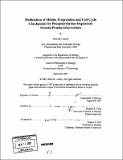Modulation of mitotic progression and cell cycle checkpoints by phosphorylation-dependent protein-protein interactions
Author(s)
Lowery, Drew M
DownloadFull printable version (65.91Mb)
Other Contributors
Massachusetts Institute of Technology. Dept. of Biology.
Advisor
Michael B. Yaffe.
Terms of use
Metadata
Show full item recordAbstract
Alteration of mitotic gene function has recently been discovered to play a key role in tumor formation and cancer progression through the induction of chromosomal aberrations and genomic instability. Polo-like-kinase-1 is a critical mitotic regulator, overexpressed in human tumors, that functions in mitotic entry after cellular stress, centrosome maturation, mitotic spindle control, and cytokinesis, which are all disregulated in cancer cells. To study the role of Polo-like kinases we took advantage of the recent discovery that the polo-box domain of Polo-like kinases is a phosphorylation-dependent binding module that regulates targeting of Polo-like kinases to their substrates. To identify the interactors of Polo-box domains we developed and performed a mitotic-specific yeast two hybrid and a pulldown mass spectrometry screen. This yielded a large number of specific interactors known to be involved in a vast variety of mitotic processes including those previously described to be involved in tumor progression. We demonstrate that Polo-like kinase regulation of cytokinesis-specific guanine-nucleotide exchange factors for the small G-protein Rho is necessary for proper actomyosin ring contraction and cytokinesis. Additionally we demonstrate that Polo-like-kinase-1 directly regulates the activity of the Rho-effector-kinase ROCK2, and thus Polo-like kinases modulate Rho signaling both upstream and downstream of Rho during cytokinesis. In addition to Polo-box domains we also worked on two other phosphorylation-dependent binding domains involved in cell cycle checkpoints that become disregulated in cancer cells, tandem BRCT domains and WW domains. (cont.) We examined the molecular basis for phosphorylation-dependent recognition by the tandem BRCT domains of BRCA1 through oriented-peptide-library screening and determination of an X-ray crystal structure of the domain bound to a phosphopeptide. This allowed us to rationalize why inherited mutations within the tandem BRCT domains of BRCA1 promote breast and ovarian cancer in humans. Secondly, we assayed WW domains that were generated from in silicon determined sequences for natural-like function to more fully understand the folding and binding requirements of this domain class. All three domains (tandem BRCT domains, Polo-box domains, and WW domains) are attractive targets for cancer therapeutics as they participate in control of processes necessary for genomic stability that become disregulated in cancer.
Description
Thesis (Ph. D.)--Massachusetts Institute of Technology, Dept. of Biology, 2007. Includes bibliographical references.
Date issued
2007Department
Massachusetts Institute of Technology. Department of BiologyPublisher
Massachusetts Institute of Technology
Keywords
Biology.